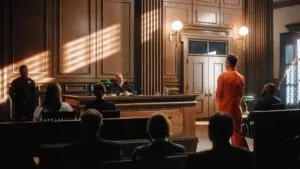
A felony pretrial hearing is a crucial stage in the criminal justice process, occurring after a defendant has been formally charged with a felony but before the case goes to trial. If you’re facing a felony pretrial hearing, you need to know what happens at one. The Simmrin Law Group can help you with this.
This hearing serves several purposes that can have a major impact on your trial. For example, plea deals are offered and accepted during pretrial hearings. Both sides exchange evidence in a process called discovery. They may also file legal motions that affect the course of your case.
Here’s what typically happens at a felony pretrial hearing and what to expect. It is best to have your own Los Angeles criminal defense lawyer before your pretrial hearing. If not, you should have a public defender who can advise you on what to expect.
Reviewing Your Case So Far
The court will start by reviewing all the charges against you and how you pleaded during your arraignment. The arraignment happens before the pretrial hearing. It’s when you said if you were guilty or not guilty.
The court will explain to both sides the timeline for future steps in your trial, like how long they have to submit motions, how long discovery should take, and the date of the trial. Decisions during the pretrial hearing may change these, but this sets expectations on the timeline for your case.
For a free legal consultation, call (310) 896-2723
Motions
A motion is a request to a court to decide on something before the trial begins. Some common motions are:
- Motion to Suppress Evidence: This is an argument to exclude certain evidence from the trial. An example is if the evidence was gathered in a way that violates your rights.
- Motion to Dismiss: A request by your lawyer to dismiss the case because of defects in the prosecution’s case. The motion would describe these defects.
- Motion for a Change in Venue: This is a request to move the trial to a different location. This is usually done if it would be impossible to get a fair trial by an impartial jury at the current court.
Motions may require additional hearings. During these hearings, the court will hear arguments from both sides about the filed motions before ruling. Your lawyer will know which motions would be suitable to file for your case.
Discovery
Assuming no motions interfere with it, the next step is discovery. The prosecution and the defense exchange the evidence they have. This includes police reports, witness statements, expert testimonies, physical evidence, and other relevant documents.
The pretrial hearing lets both sides raise questions about evidence each side has, whether any information is missing, whether any evidence should be excluded, and much more. Ultimately, it lets both sides know what evidence they will have to work with at trial before building their strategies.
Either side may find that the evidence is not in their favor at this stage. The prosecution may decide the case would be too hard to win and drop criminal charges. For the defense side, discovery may show that winning a trial might be too difficult, and a plea deal would be better.
Plea Deals
At any stage during the pretrial process, both sides could negotiate a plea deal. In a plea deal, you agree to plead guilty to a lesser charge in return for a lighter sentence or other concessions. Consider working with a law firm, such as Simmrin Law Group, to know if a plea deal is in your best interests or not.
Plea deals are not automatically accepted. If an agreement is reached, it must be presented to a judge during the hearing. The judge will make sure the deal is valid, that you’re entering into it voluntarily, and that you understand its implications.
Accepting a plea deal will mean that you’ll have a criminal record and will have to face punishment. However, there would be less punishment than you would receive if you went to a full trial and lost.
Complete a Free Case Evaluation form now
Readiness for Trial
After all motions, discovery, and plea deals are finished, the court will assess whether both parties are ready to begin trial and that no further pre-trial hearings will be necessary. If the case is ready to move forward, the court will set a trial date and begin the process of jury selection.
The court will also issue instructions to both sides about any specific legal or procedural issues that may arise before trial and what the court expects from them.
Conclusion
Pretrial hearings are integral to the felony court process, as they help ensure that the trial proceeds fairly and lawfully. They provide a platform for resolving legal disputes, clarifying the issues at stake, and ensuring the defense and prosecution are prepared for trial.
This stage is critical for the defendant because decisions made here can affect the entire outcome of the case, including the possibility of a case being dismissed or a plea bargain being accepted.
If you have been charged with a felony and need to know what may happen at your felony pretrial hearing, speak with Simmrin Law Group right now. We can represent you at your felony pretrial hearing, but we will need time to prepare. The sooner you call, the better your chances.
Call or text (310) 896-2723 or complete a Free Case Evaluation form
